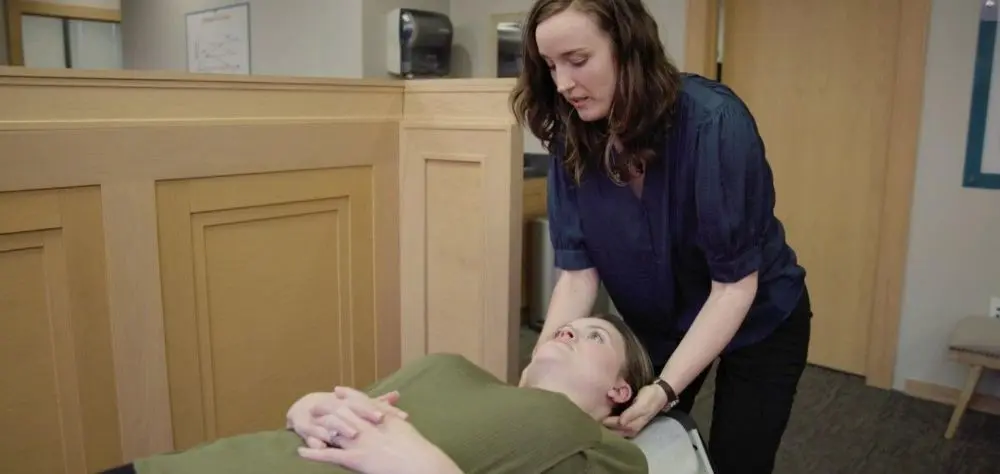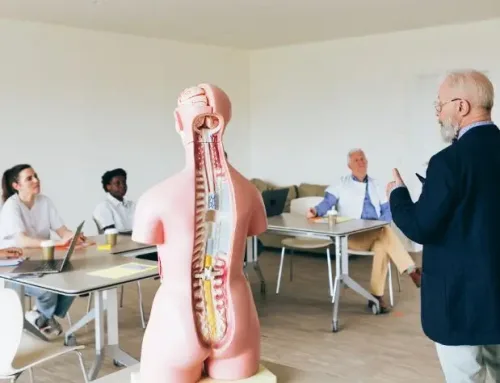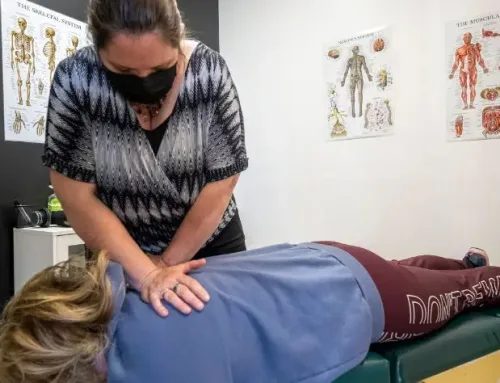Top Chiropractic Colleges in the U.S.: Hybrid Learning Options

Some of the top chiropractic colleges in the U.S. are now offering hybrid learning models—blending academic depth with modern flexibility. For students ready to enter a hands-on, patient-centered profession, this format creates a clear path forward without asking them to put their entire life on hold. It’s an approach built for today’s learners: efficient, rigorous, and rooted in real clinical experience.
If you’re exploring your next step in healthcare and want to train with purpose, hybrid chiropractic programs may be the opportunity you’re looking for.
What to Look for in a Hybrid Chiropractic Program
Hybrid learning is changing the way students enter the chiropractic profession. With a growing number of programs offering flexible formats that blend online coursework with in-person labs and clinical training, it’s easier than ever to earn your degree without uprooting your life. But flexibility alone isn’t enough, what matters is how well a program prepares you for real clinical practice, licensure, and long-term success.
From accreditation to curriculum structure, early patient exposure to entrepreneurial development, these are the features that set a high-quality chiropractic education apart.
Start with Accreditation and Exam Preparation
Before anything else, make sure the program is accredited by the Council on Chiropractic Education (CCE). Accreditation ensures that the curriculum meets national standards and qualifies you to sit for the National Board of Chiropractic Examiners (NBCE) licensing exams.
A strong hybrid program also integrates board exam preparation throughout the curriculum. You’ll want to know how the school prepares you for each part of the NBCE exams—written, practical, and clinical—and whether they offer board review resources, study support, or mock exams along the way.
Understand the Online and In-Person Balance
Hybrid programs vary in how they split instruction between online and on-campus sessions. Some deliver foundational sciences and theory online, while technique labs, diagnostics, and clinical work take place in person. Ask how often you’ll need to be on campus, how long each immersion lasts, and how the program supports your learning in both formats.
You’ll also want to consider whether the remote coursework is asynchronous (on your own schedule) or synchronous (live sessions), and how accessible your instructors will be for questions, check-ins, or virtual office hours.
Clinical Training: Early, Frequent, and Patient-Focused
One of the strongest indicators of program quality is when and how clinical training begins. Look for programs that introduce patient care early—often during the first or second year—so you build confidence and clinical reasoning before entering more advanced rotations. The best programs offer diverse practicum experiences across different patient populations, including sports medicine, family wellness, and integrative care environments.
These rotations help you refine your technique, improve communication, and see firsthand how chiropractic fits into larger healthcare systems. Ask about clinic partnerships, supervision models, and support during rotations.
A Curriculum That Matches Your Career Goals
Every chiropractor brings a unique focus to their practice—whether it’s functional care, manual adjusting techniques, sports performance, or integrative wellness. Choose a program that aligns with your professional interests and offers elective options or tracks in those areas. A well-rounded core curriculum should include diagnostics, biomechanics, radiology, neurology, rehab, and technique, but the ability to explore specialty areas is a major plus.
Look for Built-In Business and Practice Management Support
Many students enter chiropractic with the goal of opening their own practice or working in a private setting. Strong programs offer business courses as part of the core curriculum, covering topics like billing, coding, patient communication, ethics, marketing, and operations. These classes help prepare you for real-world success and support your long-term growth in the field.
Ask About Financial Support Options
Before enrolling, explore what types of financial aid and scholarships are available. A fixed tuition model helps with planning, while institutional scholarships can help lower the overall cost. Some programs also offer flexible payment plans or financial coaching to support students throughout their education.
Make sure you understand the full cost of attendance—including lab fees, travel for on-campus intensives, and clinical site expenses—so you can plan confidently.
Top 5 Chiropractic Colleges with Hybrid Learning Options
Chiropractic education is evolving—and so are the ways you can earn your degree. Hybrid learning models are now making it easier for students to complete their Doctor of Chiropractic (DC) degrees while managing work, family, and life responsibilities. The best programs combine the convenience of online learning with hands-on training that prepares you for real patients, real clinics, and a real future in healthcare.
1. Southern California University of Health Sciences (SCUHS) – Time-Tested, Forward-Thinking
At Southern California University of Health Sciences, we’ve been shaping chiropractic education for over a century, and we’re still innovating today. Our hybrid Doctor of Chiropractic program blends online learning with on-campus lab and technique intensives. You’ll complete most of your coursework online, then come to campus for focused, hands-on training sessions that bring theory into practice.
You’ll also have access to one of the most diverse and real-world clinical networks available. From our community-serving SCU Health Clinics to more than 500 external partner sites—including VA hospitals, sports clinics, integrative practices, and D1 athletics—you’ll build experience that sets your resume apart.
Program at a Glance
- Full-time, hybrid format completed in 3–4 years
- No bachelor’s required—enter with 90+ credits and finish both degrees together
- Extensive clinical training starting early in the program
- Customizable pathways in Sports Medicine, Functional Medicine, Business, and more
- Dual-degree option: earn your DC and a Doctor of Acupuncture & Chinese Herbal Medicine
- Accredited by the CCE and recognized by the California Board of Chiropractic Examiners
- Fixed tuition, financial aid, and institutional scholarships available
Our program is designed for driven students who want clinical depth, academic flexibility, and long-term career support.
Interested and ready to take the next step? Apply now or request more information to connect with our admissions team and start your journey toward becoming a Doctor of Chiropractic.
2. National University of Health Sciences (NUHS) – Lombard, IL
NUHS offers a blended-learning chiropractic program that incorporates online lecture delivery with in-person clinical labs on its Illinois campus. Known for its integrative health approach, NUHS allows students to learn alongside those in naturopathic and acupuncture programs, fostering interdisciplinary collaboration. Clinical training begins early and continues through rotations in both campus-based and community health centers. The program emphasizes evidence-informed care and professional communication.
3. Logan University – Chesterfield, MO
Logan’s Doctor of Chiropractic program includes hybrid options for foundational science courses, allowing students to manage their schedules more flexibly in the early phases of the degree. The on-campus experience focuses on biomechanics, diagnostics, and hands-on technique labs. Students benefit from Logan’s Active Learning format, which uses case-based instruction and simulation. The university also offers advanced training opportunities in sports and rehabilitation, preparing graduates for versatile roles in the field.
4. D’Youville University – Buffalo, NY
D’Youville University offers a hybrid DC program structured to accommodate working students. Online courses are paired with weekend labs and on-site clinical rotations. The school emphasizes personalized learning and small class sizes, which means more faculty interaction and support. Clinical education takes place in the school’s multidisciplinary health hub, offering exposure to collaborative, team-based patient care models. D’Youville also incorporates business training into its curriculum to prepare students for practice management.
5. Parker University – Dallas, TX
Parker University’s DC program has evolved to offer hybrid course delivery in key parts of its curriculum, particularly for science and foundational courses. Students participate in on-campus labs and technique development, while clinical training occurs through Parker’s extensive health centers and partner clinics. The university also offers specialized training tracks in sports chiropractic, pediatrics, and business, allowing students to align their education with future goals.
Set Your Direction Early with Chiropractic Specialization Options
As the field expands into sports performance, integrative wellness, functional medicine, and beyond, today’s chiropractic students are increasingly choosing programs that allow for specialization. Building your niche while you’re still in school helps you graduate with clarity, direction, and a competitive edge.
By selecting electives, emphases, or dual-degree tracks that reflect your career goals, you can shape a learning experience that’s focused, relevant, and future-ready. The best programs make that flexibility part of the core offering, giving you tools to explore and specialize before you enter practice.
Specialty Areas That Help You Stand Out
Many chiropractic colleges now offer elective paths or focused tracks to help you deepen your expertise in key areas of interest.
Look for programs that offer:
- Sports Medicine – advanced coursework, athletic partnerships, and performance care
- Functional Medicine – systems-based diagnostics, nutrition, and patient-centered plans
- Eastern & Complementary Medicine – exposure to acupuncture, herbal therapy, and integrative healing models
- Business & Practice Management – tools for building and running your own practice, including finance, marketing, and leadership
How SCUHS Supports Customized Chiropractic Education
At Southern California University of Health Sciences, we’ve built customization into the structure of our Doctor of Chiropractic program. You’ll choose from elective coursework and emphasis areas including Sports Medicine, Functional Medicine, Chiropractic Techniques, Business, and Eastern Medicine. Interested in dual training? Our unique DC/DAOM track allows you to earn two doctorates—chiropractic and acupuncture & Chinese herbal medicine—within a single integrated pathway.
Throughout your program, you’ll work closely with faculty mentors who help you shape your direction. You’ll also have access to a wide range of clinical sites that match your interests, from sports clinics to VA hospitals to functional and integrative health centers.
Build the Career You’ve Been Thinking About
Top chiropractic colleges understand that one path doesn’t fit every student. The most effective programs are those that give you room to explore your interests and tools to refine your focus, whether you’re drawn to sports medicine, integrative care, or practice ownership.
This is your chance to build a future that’s informed, intentional, and aligned with where you see yourself making an impact. Apply now or request more information to see how our chiropractic program can help you focus your path and move forward with purpose.
FAQs
What are the benefits of choosing a chiropractic program with electives or tracks?
Electives and specialized tracks let you shape your education around your goals. Whether you’re interested in sports medicine, functional care, or running your own clinic, focused coursework helps you build relevant skills and clinical experience while still in school. It also gives your resume a clear direction and helps you stand out in competitive job markets after graduation.
Do all chiropractic schools offer dual-degree or specialization options?
No, options vary widely. Some schools offer only a standard chiropractic curriculum, while others integrate tracks in areas like business, acupuncture, or sports performance. If you’re looking to specialize, it’s worth finding a program that supports that with structured pathways, mentoring, and clinical placements tied to your focus.
How do I know which chiropractic specialty is right for me?
Think about where you want to work and who you want to serve. If you’re passionate about movement and athletic performance, sports medicine may be a strong fit. If you’re drawn to holistic care or traditional healing systems, integrative or Eastern medicine could align better. Start broad, explore a few areas, and let your interests guide you as you gain experience.
What specialization options are available to students at SCUHS?
At SCUHS, students can choose from elective paths in Sports Medicine, Functional Medicine, Eastern Medicine, Chiropractic Techniques, and Business. You’ll have the chance to work with faculty who specialize in those areas and access clinical placements that match your interests. These options are built into the program so you can focus your education without extending your timeline.
Can I earn a dual degree at SCUHS?
Yes. We offer a unique dual-degree pathway where students can earn a Doctor of Chiropractic (DC) and a Doctor of Acupuncture & Chinese Herbal Medicine (DAOM). The curriculum is structured to overlap strategically, saving you time and tuition while expanding your skillset and practice scope. It’s a powerful option for students interested in integrative care.
Related Posts




